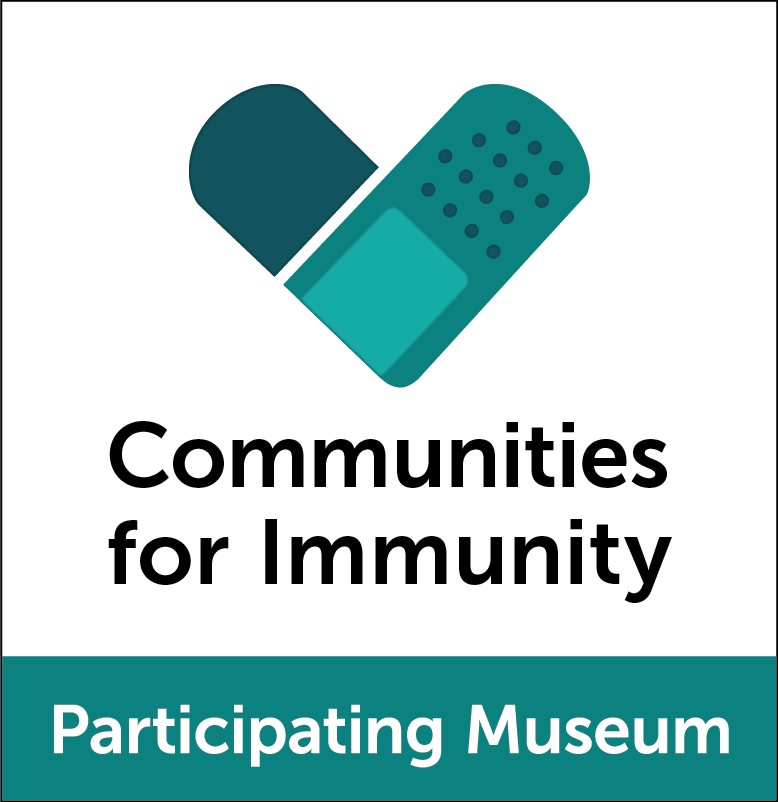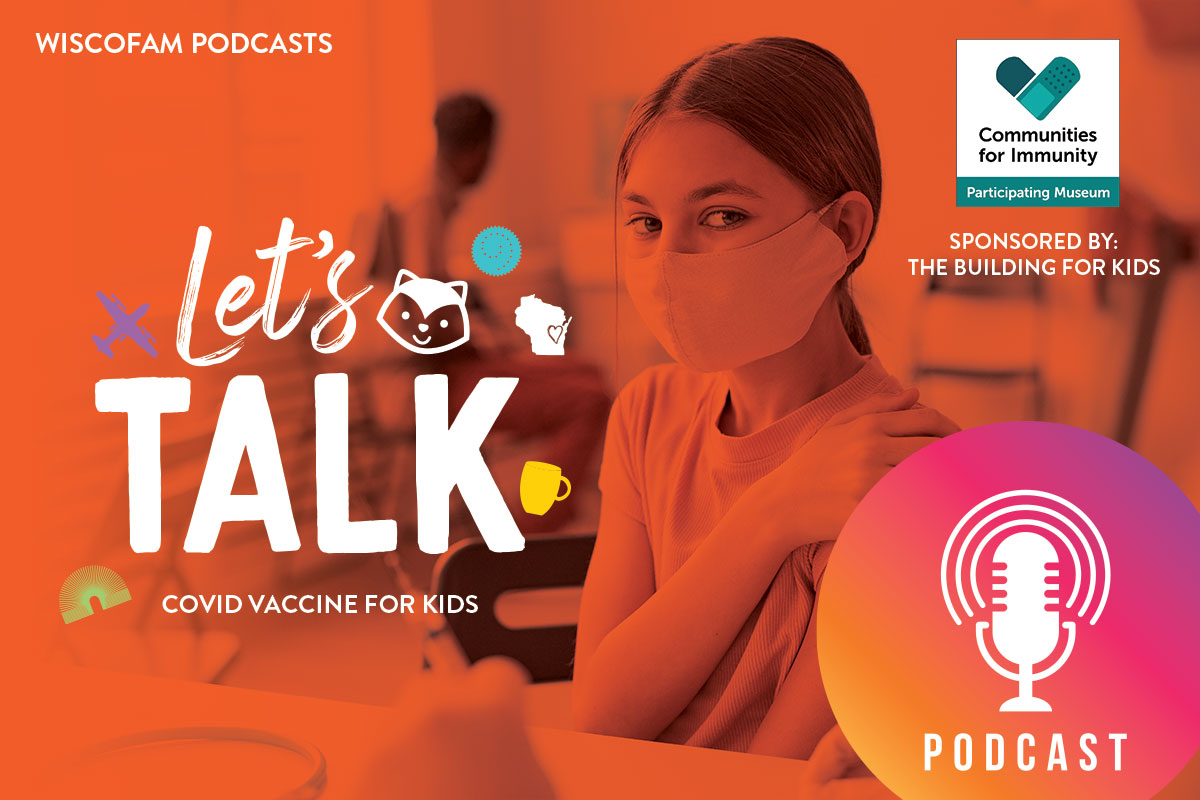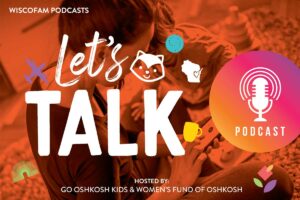The pandemic years have been challenging, confusing, and exhausting for parents. It has been loud with contradictory information and opinions, making it difficult to know who to trust at times. When vaccines became available, things didn’t get any quieter, and many families had questions. We’re talking with trusted local members of our community who work closely with the City of Appleton Health Department to address some of the concerns and questions parents have about the COVID-19 vaccine for kids.
Additional Resources
- Tips and Experiences from Fox Valley Parents
- Frequently Asked Questions & Answers about the Vaccine for Kids
- How to Prepare for Vaccines?
- Vaccine Clinics & Events for Kids in the Fox Valley

Thanks to our Sponsor
The Building for Kids seeks to be a reliable resource of information to promote the wellbeing of children and their grownups throughout our community. The BFK recently received a Communities for Immunity grant in support of their work to promote vaccine confidence. Communities for Immunity is made possible with funding from the Centers for Disease Control and Prevention and the Institute of Museum and Library Services. For more information, visit www.communitiesforimmunity.org.
Meet our Guests
Dr. Lee Vogel, Mosaic Health
Dr. Vogel is a family physician and geriatrician. She also has served as the medical advisor to the Board of Health in the Appleton City Health Department for approximately 30 years. Passionate about educating, she is a faculty teacher of Family Physicians in a residency program at the Mosaic Family Health Clinic, which trains family medicine residents.
Sonja Jensen, City of Appleton
Sonja Jensen is the interim health officer with the City of Appleton Health Department. She is also the Deputy Director with the health department and has worked with the city department for eight years.
Meet our Hosts
Amanda Chavez, Owner & Creative Director, WiscoFam / Go Valley Kids / Go Oshkosh Kids
Born and raised in Appleton, Wisconsin, Amanda Chavez has a deep love for her community. As a busy mom of 2 little girls, she and her husband are always on the lookout for fun things to do and share with others. Her work combines all of her passions – motherhood, design, and community. Some of her other interests also peak through as well, including baking, photography, and sewing!
Liz Schultz, WiscoFam / Go Valley Kids / Go Oshkosh Kids
Liz was raised in Wisconsin and returned with her family in 2008. They’ve been exploring all of the old familiar places and discovering new favorites — she shares both here with WiscoFam’s audiences. In the quiet moments, you’ll find her watering plants, reading books, or knitting. Liz is a huge fan of porches, patios, and live music.
Special Thanks
Liz Schultz, Producer, WiscoFam / Go Valley Kids / Go Oshkosh Kids
Marlo Ambras, Audio & Video Engineer, Ambas Creative
Transcript
Sonja Jensen 00:00
Hello and welcome to Let’s Talk the show that connects families with folks to answer your parenting questions. I’m Amanda Chavez. Here with my co-host, Liz Schultz, for a bonus episode of Let’s Talk About COVID Vaccine for Kids. Our guests today are Dr. Lee Vogel from Mosaic Family Health, and Sonja Jensen from the City of Appleton Health Department. They’re here to answer questions that families have as they decide whether to vaccinate their kids during the pandemic. Hi, Dr. Vogel. Hi, Sonja. Thanks for joining us. Good morning.
Liz Schultz 00:32
Good morning. Can you tell us more about your roles in the community?
Sonja Jensen 00:36
Sure. So I’m Sonja Jensen. I’m currently the interim health officer with the City of Appleton Health Department. I’ve been in that particular role for seven months. My I’m also the Deputy Director with the health department and I’ve been with the department for a little more than eight years in Appleton.
Dr. Lee Vogel 00:52
I’m Lee Vogel and I’m a family physician. I’m also a geriatrician, but I have served in the capacity as the medical advisor to the Board of Health into the Appleton City Health Department for approximately 30 years. And I’m also an educator and a faculty teacher of Family Physicians in a residency program at the Mosaic Family Health Clinic, which trains family medicine residents.
Amanda Chavez 01:18
The health and well-being of our kids is vitally important to all parents. And we’re thankful that we’ve been given the opportunity to talk with families about a health decision facing parents of kids five and older, whether they should get COVID vaccines, it has been a really loud and confusing couple of years and it can be hard to know who to listen to. So we’ve tapped the expertise of our guests today, to provide you and us with factual information about the vaccines, and to answer questions that we and other parents have about this vaccine.
Liz Schultz 01:49
Sonja, can you just tell us what the current situation is here in our community?
Sonja Jensen 01:55
We are currently we are experiencing a sharp increase in the numbers of COVID-19 cases in Appleton in the Fox Valley, and across the state of Wisconsin, we were already at a critically high level of disease burden before the arrival of the Omicron variant, which is said to be two to two and a half times more transmissible than even the highly contagious Delta variant. At this time, our healthcare systems are at capacity due to the increase in hospitalizations.
Dr. Lee Vogel 02:22
I can talk a little bit about that having been at a meeting that summarized and forecasts what we’re seeing and about to see in our region relative to health care. As we adjust and care for people with COVID, we anticipate a very steep rise in cases because we’re doubling every couple of days. We currently have hospitals in our region that are 97.5 to 99% capacity, which means that there’s not a lot of room to manage anybody who comes to the emergency room, whether they have COVID-related illness, or they have non-COVID illness such as heart attacks and strokes. And children are part of an ecosystem part of the community. And in the middle of a pandemic, we try to address every possible measure that we can to help reduce spread to serve to diminish the effects of COVID. I know that the pediatricians reported this morning that in their pediatric clinics, about 25% of the visits are due to COVID. And we know that the hospitalizations are increasing.
Amanda Chavez 03:29
Thanks for sharing that. If kids aren’t getting that sick, why do they need the vaccine?
Sonja Jensen 03:33
Even though there are a number of cases I think that are considered to be mild and not serious, told him to get COVID-19 can get very sick and require hospitalization and even die. I know there’s been a rise in hospitalization rates in children, especially recently. So we are seeing that in the community and across the country. And I think the important thing to remember what this too is, as Dr. Vogel was talking about earlier, children are part of that ecosystem or part of the community. So even if they have mild illness, they can pass it to other may be susceptible people in their, in their household in the community, you know, and at school.
Dr. Lee Vogel 04:10
I thought I’d talk a little bit about you know, just being really honest, it is a milder illness and but but for us to quickly move from a virus that actually can cause significant syndromes like multi inflammatory syndrome, even though rare or, or myocarditis, the illness itself can cause myocarditis, we need to remember that that’s true and not quickly say that it’s as mild as a common cold even though that’s the majority of the experiences that children are having. myocarditis is something that actually occurs more, 30 times more, commonly in COVID than it does in a child that got vaccinated. And so the concern about myocarditis cases after vaccination for children, is really should be put into the context of we prevent more cases of myocarditis. From COVID by vaccinating children that are caused and it’s extremely rare situation. I think the other thing about some reasons that people are, are concerned about not vaccinating maybe some of the myths that we might want to start talking about have a lot to do with anywhere from the beginning of the rollout with people’s concerns about it was a rushed vaccine. And I think that when you go to reliable resources and news media to find out about the various myths such as that you start one by one, dispelling those myths. And I think we’re at a point right now where perhaps the greatest myths have been addressed. And if you’d like we can talk about some of those specifically, infertility is one of those particularly people are worried about teens becoming infertile. And there’s absolutely no data whatsoever to suggest that that’s a problem. We’ve had people concerned about altering their DNA. And, you know, the mRNA is a, it’s basically a messenger, it doesn’t go inside the cells. And the nucleus of the cells where the DNA is held in our cells in the arms where the vaccine is administered. And so it doesn’t have an opportunity to change the DNA, it’s just instructing the cell to make the appropriate sort of antibodies, and to mount an immune response that would be necessary, should somebody later become infected with the virus.
Liz Schultz 06:26
So there’s no live virus in these vaccines, like another concern that we see is that people are worried about vaccine shedding. Is that a possibility with this vaccine?
Dr. Lee Vogel 06:38
There is no live virus, there’s no opportunity to get this COVID illness from getting a vaccine. I think that one of the other concerns that people have about vaccine hesitancy has to do with thinking that now that we know that we’ve been through several variants, including the Delta variant, and we’re into an Omicron variant, that concern that, you know, people are getting their natural immunity, it’s much more contagious. And once they’ve had their natural immunity, they therefore don’t need a vaccine, or that people who are vaccinated are actually getting the breakthrough cases and getting ill and or spreading it. And I probably talked about those things as well, which I think is important. We are seeing people get breakthrough cases. Vaccination, immunizations have never intended to address and suppress 100% of any sort of viral illness. They are meant to present the to prevent the consequences of that illness. So hospitalizations, serious illness, death, and then long term chronic health problems as a result of the illness itself. So we never expected to be 100%. We’ve seen ranges depending upon the vaccine, and depending upon how many in the series or and now a booster and we’ll talk about that booster a little bit too, because it’s misnamed now. But we see ranges between 70 and 85 or 90% in children. Sonja can tell us a little bit about the effectiveness of the vaccinations against COVID and children. But the point being that there are going to be people that get breakthrough disease right now, almost all of the people who are in the hospital that are hospitalized and fighting for their lives are dying, have not been vaccinated, and some maybe have been vaccinated but in completely so and didn’t receive a booster so we’re and we’re seeing not only more people with vaccinated get the virus and people thinking that having been vaccinated, vaccinate, vaccines everywhere, and now we’re getting this increase. Some people are associating vaccination with increase in spreading it. And what we need to help people understand is that the Omicron variant is milder, it causes about 1/3 of the hospitalizations that the Delta variant did. So, fortunately, in terms of its seriousness, it is decreasing. However, it is spread so to so many people, so many more people have it that that still, by sheer absolute numbers is overwhelming our health care system and people are still dying and becoming fairly sick from it.
Sonja Jensen 09:19
I know that we are talking about how effective it is. So the Pfizer Biotech COVID-19 vaccine, which is the one that is approved for children is the only vaccine in the US approved for children at this time, it is over 90% effective at preventing COVID-19 And that’s in children ages five through 11 years of age.
Amanda Chavez 09:39
So the COVID vaccine for kids is a two-shot process. Right? So how if we’re in the surge right now, like how effective or how important is it for them to get vaccinated now or is it too late?
Sonja Jensen 09:53
Oh, no, it’s never too late to get vaccinated for COVID-19. It is probably even more important right now that if you have not initiated the series children or adults, that you can initiate the series of the COVID-19 vaccination now, and yeah, it is a two dose. So right now children aged five through 11, it is a two dose separated by at least three weeks. And now for its newly approved anybody age 12 and up that’s been vaccinated with the two dose series, it is recommended that within five, it can be at least five months later, that they can get what is called a booster dose of that, of the vaccine. And for anybody that is under 18. That would be the Pfizer.
Dr. Lee Vogel 10:36
And if you don’t mind me a moment to talk about the booster because that’s one of the rationale for people to think that maybe they don’t need to get vaccinated or to feel like it’s a less effective vaccine, or to wonder are we going to have to get boosters forever kind of thing. Just to put into perspective boosters are, we’re thinking that this is actually a three series vaccination rather than two series with a booster. You know, we’re learning about this, this virus as time goes on. And as we get more science and as we get more science, we may adjust whether we talk about more in doses and in a series versus adding a booster. But the concept of a booster has never led us to think that a vaccine is ineffective in the past. In fact, or nor have we thought that multiple doses is something unusual when you think about childhood immunizations. Many of them are a series of two, three, and even four or five. With a booster coming at the age of five or even our tetanus you get it and you get a booster in 10 years or seven years, depending upon the kind. We used to think that the pneumonia vaccine and people who are 65 was going to be a one and done. And now we know that we have to boost every once in a while. This is just science, learning more about the practices that we use to help fight viral infections.
Amanda Chavez 11:56
We’ll take a quick break and then come back with a couple more questions for you. Dr. Vogel. Sonja, thank you so much. Really appreciate you sharing your information with families in the Fox Valley. If there was anything else you’d want to share or a message to families in the Fox Valley before we send you on your way.
Sonja Jensen 12:16
Sure, it’s been my pleasure to be here. Thank you for inviting me. I would just like to say getting children or anybody five years and older vaccinated can help protect them from getting COVID-19. It can also help keep them in school and group activities by helping stop the spread of COVID-19 in the community.
Sponsor Message 12:33
This bonus episode of Let’s Talk is brought to you through a partnership between Wisco fam the parent company and Go Valley Kids and Go Oshkosh Kids, and the Building for Kids. The Building for Kids seeks to be a reliable resource of information to promote the well-being of children and their grownups throughout our community. The Building for Kids recently received a Communities for Immunity grant in support of their work to promote vaccine confidence. Communities for Immunity is made possible with the funding from the Centers for Disease Control and Prevention and the Institute of Museum and Library Services. For more information visit communitiesforimmunity.org.
Amanda Chavez 13:07
Thanks again, Dr. Vogel for being here with us. One thing we’ve been talking about or have also heard from parents are questions around, what if your child already had COVID? And it was mild? Is it? Would you still recommend getting that vaccine? Or is it not needed with those families?
Dr. Lee Vogel 13:25
So having gotten the virus and getting sick, whether mild or moderate, people have a natural, reasonable question to say, “Do I need to get a vaccine if I’ve been sick? Don’t I have a natural immunity?” There’s a lot of conversation about natural immunity in the community. You know, we learn more about natural immunity for a particular virus, you know, like in the pandemic, as time goes on. And we studied and certainly with this new increase in Omicron, and so many more people getting ill will probably know a whole lot more about natural immunity forthcoming, but we don’t believe from the science that we’ve done thus far that you can depend upon natural immunity to protect you. It’s variable from person to person, it has so many factors that influence your ability to mount the right immune response all the way from, did you get too mild of an illness? Did you not get exposed very much is your immune system well or not? And it’s variable. And so we still recommend getting vaccinated,
Amanda Chavez 14:31
I think is a parent, I have a third grader and a fifth grader. How important are these vaccines, getting kids vaccinated and in the schools right here, even in Appleton or in the Fox Valley, and how that looks different whether kids are vaccinated or not.
Dr. Lee Vogel 14:49
Those are good questions and they and they come from the heart of a parent right, you’re in you’re raising your children in the middle of a pandemic with a lot of confusing information and even where the science changes from day to day or week to week, which doesn’t mean it was wrong as this, we’re trying to put it all together. And you’ve watched from the very beginning of it for a complete shutdown, to now where kids are back in school, having been through variations of home without education to home and virtual to blended to, you know, in school with mandatory masking, or maybe not mandatory masking. And, you know, it’s been a hard time, and you’re wondering about the effects of masks on your kids, you wonder about the effects of vaccines on your kids. And I said, I think through all of this, the best thing for children is to be in school, there’s a lot that’s resulted from the pandemic that’s been harmful to children. And I could say that probably the least harmful thing we can do to children during the pandemic, is vaccinate them. Vaccination is the key to keeping kids in school, it’s probably the key to keeping kids in school without masks, without masking as much once I work for us as affected by Omicron, or any other new variant that we don’t know about that work for us as teachers, parents, health care. And it’s really hard for teachers and the staff at a school to keep up with things if we don’t have an, you know, a critical number of children and staff vaccinated. So I think it’s really important for your children.
Liz Schultz 16:21
So thinking about the newness of the vaccines, is there like was it rushed? The process rushed through? Or how were we able to get it so quickly, when we’re not able to have quick vaccines for others?
Dr. Lee Vogel 16:38
That’s a good question. I think one of the things is that the technology for the mRNA vaccines has actually been around for decades, and has been used to create a variety of medications. And in fact, manufacturers were looking at using that technology for the next round of influenza vaccines. So the technology was there. Then when it comes to the studies, when you think about studying medications, and the various phases of trials, just to make this sort of simple. Oftentimes, we’re studying medications or vaccinations for illnesses that are not as common or even if they’re more common, they’re not as common as what has been happening in the pandemic. So when you look to, to design, research, and get what we call cohorts of subjects, human subjects, people who are going to be vaccinated, and control groups of people who aren’t going to be vaccinated, you need a certain number of people to make that an effective study. And when you’ve got a rampant virus and a pandemic, you’re suddenly you can build those groups and get enough people so that you’ve got 40-50,000 people in a study in a short period of time where it might have taken a longer period of time. So there’s a combination thanks, no corners were cut. And you know, emergency use was is a mechanism for getting it out while the FDA is moving it through their, their their review process. But that became something that could have launched the manufacturing as opposed to any cutting of corners.
Liz Schultz 18:14
I want to just revisit something quickly you when we were talking about getting kids vaccinated who have already had COVID. So we were unlucky enough to catch COVID right before the adult vaccines became available. And our daughter also got it. So if she is vaccinated and had has natural immunity to is there a benefit to that, having both?
Dr. Lee Vogel 18:45
Some of the early research has demonstrated that some of the best protection and most long lasting protection may be the combination of natural immunity and vaccination. And I can’t speak to which, which is best to have first. But I do think that no matter what vaccination isn’t, is a key part of your best protection
Liz Schultz 19:08
And kind of a tack-on to that, as we see more variants, will the vaccines, does it seem like they’ll continue to be effective?
Dr. Lee Vogel 19:18
That’s a great question. And we’re still kind of learning I you know, how how much Omicron is responding to the immunization that’s been done prior to that variant taking hold. And we think that one of the reasons that that that it is so mild is not only has it mutated to some degree, but also that we have so many people that are vaccinated. So the fact that many people with vaccination are not in the hospital is a key to that. Going forward. It’s right now we’ve got a lot of people speculating and predicting. And that makes me really worried I wouldn’t be able to say from the science or the patterns, or what the epidemiologist say even the experts that we could count on not having another variant, we can count on probably having another variant. The question is, will these variants get milder and milder and milder? It’s too soon to say. What I think is true, however, is that we all no matter what need to learn to live with this virus, but we right now all have a very different idea about living with virus is. And I would caution people to not think that living with a virus means treating it like a common cold, and not worried about vaccination, or not worrying about masking indoors and not worried about, you know, modifying your activities, it’s too soon to do that. To me, the most successful living with a virus living with this virus is to be vaccinated, just like we’ve learned to live with influenza where we get our annual vaccinations. And that’s not to say that this is as harmless as influenza, it is much more so. But you know, living with many of them, of the modern illnesses that we can expose to means getting vaccinated.
Liz Schultz 21:04
Great, thank you.
Amanda Chavez 21:06
We can agree that there’s, we all want to be past this move past where we’re at and, and learn from what what’s going on.
Liz Schultz 21:15
Yeah, my daughter was really tearful about it, like, “I just need this to be over.” I felt like yeah, me too, I need it to be over too!
Dr. Lee Vogel 21:26
We do, we do, it’s and we need, it’s gonna be a difficult month. But the more we’re vaccinated, the more we can, can help each other, remind each other that we’re in this together, nobody has to shoulder it alone. And looking for the positive inside of it, you know, every silver lining is important. And I think one of the silver linings that is here that we are missing, because of all of the that the turmoil and the myths and the divisiveness in our in our country is that this vaccination, these vaccines are actually, you know, they’re they’re a miracle of modern science. In any other decade, we would have been claiming that and lining up, I hope we can recapture that. Because we’ve done a pretty good job of, you know, using science to to fight this pandemic. And now we just have to use ourselves to accept that science.
Amanda Chavez 22:23
I really appreciate you being here with us and talking candidly about just being a parent and how hard it is. And this just been another hard thing to figure out for some parents, whether to vaccinate their children, is there anything else that you’d like to share? Or anything that we missed? Or?
Dr. Lee Vogel 22:43
Like, you know, I just, I’m one that honestly believes that. It’s, it’s not just about doctors and experts and government leaders telling people what to do. It’s years of science and years of public health. But not even that alone. It’s really about being neighbors and friends and understanding that there’s a common good, and one of the things that I learned from the parents and the children that come to our clinic is that there is a lot of resilience. And, and there’s children who speak up to say, they’re excited about getting vaccinated because it means that they’re helping their family. And I think if we can just recapture that spirit of goodwill, it’ll help us through the toughest times.
Amanda Chavez 23:39
Thank you, Dr. Vogel, for being here with us today. And thank you for listening. We hope that this conversation has helped you with the decision-making for your family. You can find a transcript and articles to support your family decisions on our website, through testing vaccine locations, school district policies, and more on govalleykids.com. Visit govalleykids.com to continue this conversation and find links and resources that we discussed today. And I think the only other thing I wanted to mention was if you’re listening, and you’re a parent, and you’ve been on the fence about getting a vaccine, it’s still time for them. They could still get vaccinated. It’s not too late for parents in the valley to get vaccinated as well.
Dr. Lee Vogel 24:21
No, it’s not too late for anybody to get vaccinated and to get boosted. It’s sort of wasting your series to begin with, the longer you go with before you get boosted. And we definitely know that that third vaccine is helpful. I guess it would encourage people to talk to their pediatrician or their family physician to those are trusting relationships. And if you’re still on the fence, you know, you know it’s one thing to listen to somebody talking in a podcast it’s quite another to have that more intimate, honest conversation with your doctor who you trust.
Sponsor Message 24:54
This bonus episode of Let’s Talk is brought to you through a partnership between WiscoFam, the parent company of Go Valley Kids and Go Oshkosh Kids and the Building for Kids. The Building for Kids seeks to be a reliable resource of information to promote the well-being of children and their grownups throughout our community. The Building for Kids recently received a Communities for Immunity grant in support of their work to promote vaccine confidence. Communities for Immunity is made possible with the funding for the Centers for Disease Control and Prevention and the Institute of Museum and Library Services. For more information visit communitiesforimmunity.org




